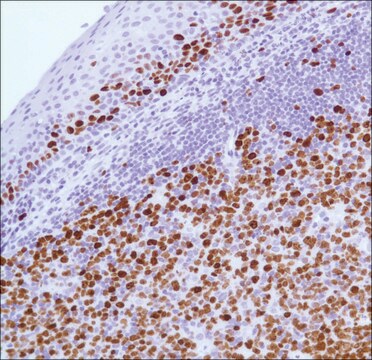275R-1
Ki-67 (SP6)
About This Item
Produits recommandés
Source biologique
rabbit
Niveau de qualité
100
500
Conjugué
unconjugated
Forme d'anticorps
culture supernatant
Type de produit anticorps
primary antibodies
Clone
SP6, monoclonal
Description
For In Vitro Diagnostic Use in Select Regions (See Chart)
Forme
buffered aqueous solution
Espèces réactives
human
Conditionnement
vial of 0.1 mL concentrate (275R-14)
vial of 0.5 mL concentrate (275R-15)
bottle of 1.0 mL predilute (275R-17)
vial of 1.0 mL concentrate (275R-16)
bottle of 7.0 mL predilute (275R-18)
Fabricant/nom de marque
Cell Marque™
Technique(s)
immunohistochemistry (formalin-fixed, paraffin-embedded sections): 1:100-1:500
Isotype
IgG
Contrôle
tonsil
Conditions d'expédition
wet ice
Température de stockage
2-8°C
Visualisation
nuclear
Informations sur le gène
human ... MKI67(4288)
Catégories apparentées
Description générale
Qualité
 IVD |  IVD |  IVD | RUO |
Liaison
Forme physique
Notes préparatoires
Autres remarques
Informations légales
Vous ne trouvez pas le bon produit ?
Essayez notre Outil de sélection de produits.
Code de la classe de stockage
12 - Non Combustible Liquids
Classe de danger pour l'eau (WGK)
WGK 2
Point d'éclair (°F)
Not applicable
Point d'éclair (°C)
Not applicable
Certificats d'analyse (COA)
Recherchez un Certificats d'analyse (COA) en saisissant le numéro de lot du produit. Les numéros de lot figurent sur l'étiquette du produit après les mots "Lot" ou "Batch".
Déjà en possession de ce produit ?
Retrouvez la documentation relative aux produits que vous avez récemment achetés dans la Bibliothèque de documents.
Protocoles
3D cell culture protocol for generating epidermal human skin tissue using primary human keratinocytes, dermal fibroblasts, and collagen-coated transwell inserts.
3D cell culture protocol for generating epidermal human skin tissue using primary human keratinocytes, dermal fibroblasts, and collagen-coated transwell inserts.
3D cell culture protocol for generating epidermal human skin tissue using primary human keratinocytes, dermal fibroblasts, and collagen-coated transwell inserts.
3D cell culture protocol for generating epidermal human skin tissue using primary human keratinocytes, dermal fibroblasts, and collagen-coated transwell inserts.
Contenu apparenté
Un bref aperçu de l'immunohistochimie (IHC) pour le diagnostic et de son importance en biologie médicale moderne. Apprenez-en davantage sur l'IHC et sur son rôle dans le diagnostic des cancers et la détection des maladies infectieuses.
Diagnostic immunohistochemistry overview highlights its importance in cancer diagnosis and detecting infectious diseases in modern clinical pathology.
Diagnostic immunohistochemistry overview highlights its importance in cancer diagnosis and detecting infectious diseases in modern clinical pathology.
Diagnostic immunohistochemistry overview highlights its importance in cancer diagnosis and detecting infectious diseases in modern clinical pathology.
Notre équipe de scientifiques dispose d'une expérience dans tous les secteurs de la recherche, notamment en sciences de la vie, science des matériaux, synthèse chimique, chromatographie, analyse et dans de nombreux autres domaines..
Contacter notre Service technique








